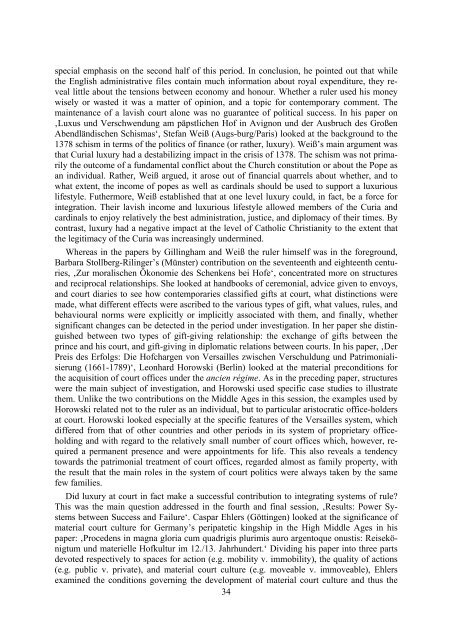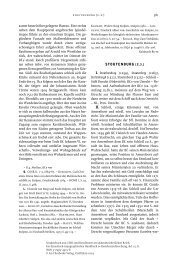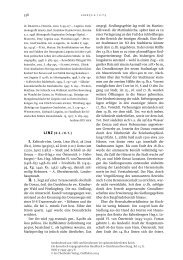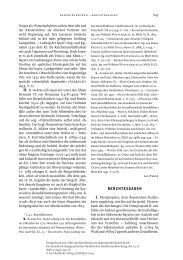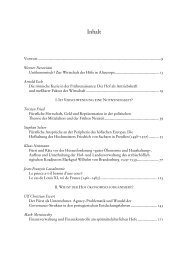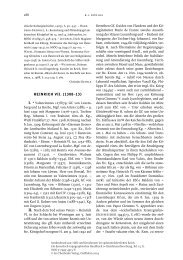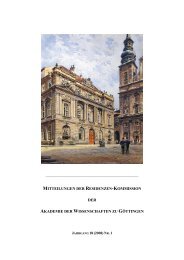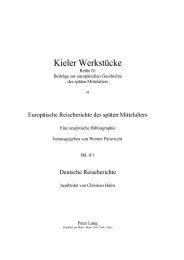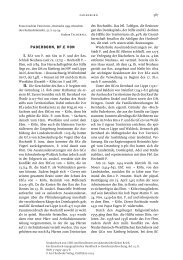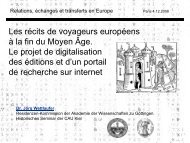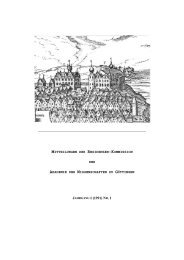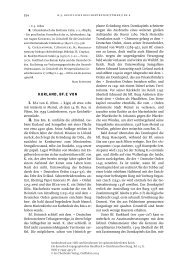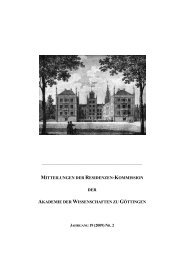MITTEILUNGEN DER RESIDENZEN-KOMMISSION DER ...
MITTEILUNGEN DER RESIDENZEN-KOMMISSION DER ...
MITTEILUNGEN DER RESIDENZEN-KOMMISSION DER ...
Sie wollen auch ein ePaper? Erhöhen Sie die Reichweite Ihrer Titel.
YUMPU macht aus Druck-PDFs automatisch weboptimierte ePaper, die Google liebt.
special emphasis on the second half of this period. In conclusion, he pointed out that while<br />
the English administrative files contain much information about royal expenditure, they reveal<br />
little about the tensions between economy and honour. Whether a ruler used his money<br />
wisely or wasted it was a matter of opinion, and a topic for contemporary comment. The<br />
maintenance of a lavish court alone was no guarantee of political success. In his paper on<br />
‚Luxus und Verschwendung am päpstlichen Hof in Avignon und der Ausbruch des Großen<br />
Abendländischen Schismas‘, Stefan Weiß (Augs-burg/Paris) looked at the background to the<br />
1378 schism in terms of the politics of finance (or rather, luxury). Weiß’s main argument was<br />
that Curial luxury had a destabilizing impact in the crisis of 1378. The schism was not primarily<br />
the outcome of a fundamental conflict about the Church constitution or about the Pope as<br />
an individual. Rather, Weiß argued, it arose out of financial quarrels about whether, and to<br />
what extent, the income of popes as well as cardinals should be used to support a luxurious<br />
lifestyle. Futhermore, Weiß established that at one level luxury could, in fact, be a force for<br />
integration. Their lavish income and luxurious lifestyle allowed members of the Curia and<br />
cardinals to enjoy relatively the best administration, justice, and diplomacy of their times. By<br />
contrast, luxury had a negative impact at the level of Catholic Christianity to the extent that<br />
the legitimacy of the Curia was increasingly undermined.<br />
Whereas in the papers by Gillingham and Weiß the ruler himself was in the foreground,<br />
Barbara Stollberg-Rilinger’s (Münster) contribution on the seventeenth and eighteenth centuries,<br />
‚Zur moralischen Ökonomie des Schenkens bei Hofe‘, concentrated more on structures<br />
and reciprocal relationships. She looked at handbooks of ceremonial, advice given to envoys,<br />
and court diaries to see how contemporaries classified gifts at court, what distinctions were<br />
made, what different effects were ascribed to the various types of gift, what values, rules, and<br />
behavioural norms were explicitly or implicitly associated with them, and finally, whether<br />
significant changes can be detected in the period under investigation. In her paper she distinguished<br />
between two types of gift-giving relationship: the exchange of gifts between the<br />
prince and his court, and gift-giving in diplomatic relations between courts. In his paper, ‚Der<br />
Preis des Erfolgs: Die Hofchargen von Versailles zwischen Verschuldung und Patrimonialisierung<br />
(1661-1789)‘, Leonhard Horowski (Berlin) looked at the material preconditions for<br />
the acquisition of court offices under the ancien régime. As in the preceding paper, structures<br />
were the main subject of investigation, and Horowski used specific case studies to illustrate<br />
them. Unlike the two contributions on the Middle Ages in this session, the examples used by<br />
Horowski related not to the ruler as an individual, but to particular aristocratic office-holders<br />
at court. Horowski looked especially at the specific features of the Versailles system, which<br />
differed from that of other countries and other periods in its system of proprietary officeholding<br />
and with regard to the relatively small number of court offices which, however, required<br />
a permanent presence and were appointments for life. This also reveals a tendency<br />
towards the patrimonial treatment of court offices, regarded almost as family property, with<br />
the result that the main roles in the system of court politics were always taken by the same<br />
few families.<br />
Did luxury at court in fact make a successful contribution to integrating systems of rule?<br />
This was the main question addressed in the fourth and final session, ‚Results: Power Systems<br />
between Success and Failure‘. Caspar Ehlers (Göttingen) looked at the significance of<br />
material court culture for Germany’s peripatetic kingship in the High Middle Ages in his<br />
paper: ‚Procedens in magna gloria cum quadrigis plurimis auro argentoque onustis: Reisekönigtum<br />
und materielle Hofkultur im 12./13. Jahrhundert.‘ Dividing his paper into three parts<br />
devoted respectively to spaces for action (e.g. mobility v. immobility), the quality of actions<br />
(e.g. public v. private), and material court culture (e.g. moveable v. immoveable), Ehlers<br />
examined the conditions governing the development of material court culture and thus the<br />
34


